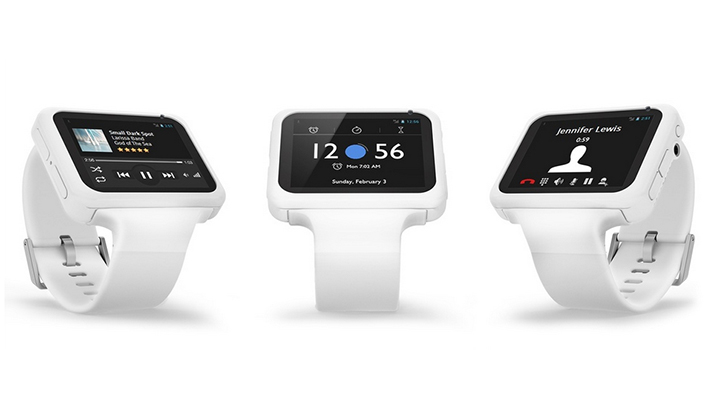Meanwhile, Wilkins said Neptune was able to put Android on a smartwatch-sized screen simply because the 320 x 240 resolution was already supported by the OS.
"Obviously we made a lot of UI tweaks to make it work smoothly and comfortably on a smaller screen," he said. "But there's actually a lot of older Android phones that have the same resolution as us, so there was very little modification besides making it more usable and changing the size of the buttons."
Over our video call, Wilkins demonstrated how Pine could upload Facebook, check email, play a game of Angry Birds Rio and switch between apps almost seamlessly.
"It can completely replace your phone, but we know people aren't ready to give up their phones yet so we have a really good tethering app, so [Pine] will also work as a tethered device for your notifications, text messages, email, and you can answer calls from it.
"We want people to get the device without having to choose between this or their iPhone, and adopt it to fit in whatever equipment setup they have already."
Pine, by the way, offers tethering for both iOS and Android.
Complications and future advancements
The Pine smartwatch could be revolutionary but it's not without drawbacks. One very important point to note is it only supports up to 3G speeds. Wilkins explained the speed ceiling is really due to a limitation of components.
Get daily insight, inspiration and deals in your inbox
Sign up for breaking news, reviews, opinion, top tech deals, and more.
"The reason we don't have 4G was when we were looking at antenna considerations, the 4G space requirements were a little out of our range," he said. "It would have just made it too big and we're pushing the limits on this at the moment to fit 3G GSM and enough space that the antenna and board don't interfere with each other."
"We're about at the size limit and still we've had to overcome a lot of technical barriers to have it working smoothly and pass FCC regulations so you don't have to worry about dropped calls or any antenna inefficiencies."
Moving forward, the Neptune team is still tweaking Pine to reduce the size and refine the user experience. On top of this, they hope to improve the battery life from eight hours of talk time and 120 hours on standby. That said, Wilkins also sees a lot of emerging technologies on the horizon for the next generation Pine device.

"There's a few new technologies we're looking at like flexible OLED and things like this that are just coming into production. Obviously a bunch of different low-energy technologies let us extend our battery life and there's a lot of other cool technology we're looking at for next-gen."
The roadmap to reality
The Pine smartwatch has already garnered enough support on Kickstarter to raise well over its initial $100,000 CAD goal. Combine that with the 2,007 backers, 1,839 of which have actually pre-ordered a Pine, and it seems like the smartwatch stands a good chance of making it out the door.
By January, Neptune expects to produce at least 2,500 Pine units to be shipped throughout the US and Canada, plus international orders sent worldwide for an additional $15 (about £9/AU$15). However, Neptune stated that Pine has only met regulatory requirements for Canada, the United States, China, India, and the European Union.
The Neptune Pine smartwatch is up for pre-orders starting at $215 (about £131/AU$237) for the 16GB model and $262 (about £159/AU$289) with double the storage. When the Pine comes to its full retail launch in 2014, it will be available starting at $314 (about £192/AU$347).
While even the most popular Kickstarter campaigns have fizzled before their products make it to backers, Wilkins said he is 100% confident that Neptune will be ship Pine by the end of next month.
"We're most of the way through tooling and setting up our assembly line. It's really just getting the funds for the materials, but we have working devices and overcome all the major technical challenges to it."
Kevin Lee was a former computing reporter at TechRadar. Kevin is now the SEO Updates Editor at IGN based in New York. He handles all of the best of tech buying guides while also dipping his hand in the entertainment and games evergreen content. Kevin has over eight years of experience in the tech and games publications with previous bylines at Polygon, PC World, and more. Outside of work, Kevin is major movie buff of cult and bad films. He also regularly plays flight & space sim and racing games. IRL he's a fan of archery, axe throwing, and board games.
